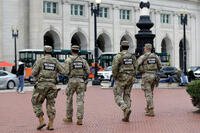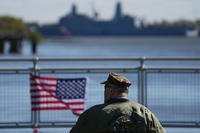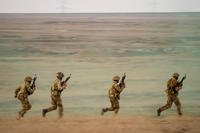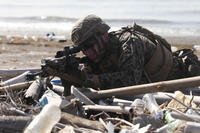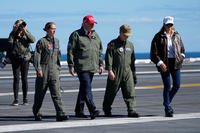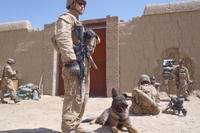Defense Secretary Ashton Carter met with his South Korean counterpart Thursday to discuss "extended deterrence" against North Korea that could include the permanent stationing of B-52 Stratofortress and B-1B Lancer bombers and F-22 Raptor fighters on the peninsula.
The two leaders also renewed their commitment to placing the Terminal High Altitude Area Defense anti-missile system in South Korea but gave no timeline for when it would be activated.
On Wednesday, U.S. Secretary of State John Kerry said the THAAD system should be operational in South Korea "as soon as possible."
Carter and South Korean Defense Minister Han Min-koo spoke at a Pentagon news conference shortly after U.S. Strategic Command announced the detection of a failed intermediate-range Musudan missile test by North Korea.
In a statement, StratCom said the attempted missile launch occurred near the northwestern city of Kusong.
"The North American Aerospace Defense Command determined the missile launch from North Korea did not pose a threat to North America," StratCom stated.
In his remarks, Han said that his discussions with Carter included "various measures to promote extended deterrence" against North Korea. He said a working group is being set up to decide what that would entail.
Speaking through a translator, Han said, "We discussed a lot of options, including permanently deploying U.S. strategic assets on a rotational basis."
South Korean news outlets have said the deployments could include B-52 and B-1B bombers, and F-22 Raptor advanced fighters.
Carter did not comment on future deployments but said of the failed missile launch, "As with previous tests we strongly condemn last night's attempt, which, even when failed, violated several U.N. Security Council resolutions, and affirm that this latest provocation only strengthens our resolve to work together with our Republic of Korea allies to maintain stability on the peninsula."
The failed launch was believed to be the eighth time this year that North Korea has tested the Musudan missile, which is thought to have a range of 1,500 to 2,400 miles, capable of hitting targets in Guam and Japan.
"Make no mistake -- any attack on America or our allies will not only be defeated, but any use of nuclear weapons will be met with an overwhelming and effective response," Carter said.
-- Richard Sisk can be reached at Richard.Sisk@Military.com.


